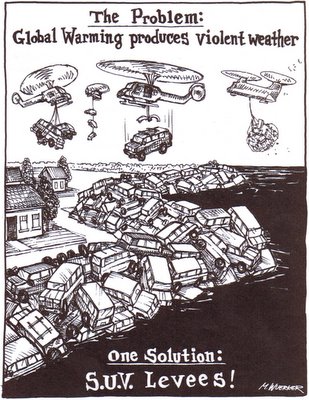Reflections on the natural disasters of 2005 - rebuilding lives is more than just bricks
Looking back on 2005 in the future, the prominence of natural disasters over the past 12 months will be hard to ignore. Due to the sheer scale of these disasters, people will continue to struggle with the ongoing effects the Boxing Day Tsunami, Hurricane Katrina and the Pakistani earthquake, well into the new year and beyond.
Denise Dorsey, president-elect of the New Orleans Psychoanalytic Center, said that for many, the devastation was beyond an ability to cope. "Looking down a street where it's house after house, and the garbage and the innards of the houses, there's something about it that people in general can't grasp," Dorsey said. "It's not within the realm of any experience anyone's ever had. Your ordinary American doesn't have that in their repertoire of experience."
I gained a new appreciation for the sheer scale of the disaster after reading David Helvarg's article in the latest issue of Multinational Monitor. "The Storm this Time: A Personal Account of Natural and Unnatural Disaster in the Wake of Hurricane Katrina" is a fine example of the 'make me see' school of journalism, and is well worth reading. I also really liked the irony of David's introduction.
"I'm flying to New Orleans and the Gulf Region by way of Ronald Reagan (Washington D.C) and George Bush (Houston) airports to see how "less government" functions in the wake of a coastal catastrophe. Actually, given that it's three weeks since Hurricane Katrina made landfall, we already know the answer."
When it comes to rebuilding the areas devastated by disaster, I can understand why there is an immediate focus on rebuilding houses and other infrastructure (especially in the remote areas of Pakistan where being left in cold conditions without shelter is a killer). But at the same time it concerns me so much focus is placed on the physical rebuilding because, in many cases, rebuilding the houses is the easy bit. The media also like the reassurance of the 'rebuilding' stories, and their implied message that the government and private donations are being put to a 'quantifiable' bricks and mortar use, when it is going to a great deal more to rebuild people's lives.
Earlier in the year I highlighted an article looking at the mental health impact of the Asian Tsunami. As hurricane evacuees now return to their homes in New Orleans it is good to see the US media also covering the mental health legacy of Katrina, even if the Herald Tribune story has a 'tabloid like' focus on the expected increase in the number of suicides.
While every suicide is tragic, a great many more people will continue to struggle with grief for the loss of loved ones, survivor guilt, depression and anxiety disorders such as post-traumatic stress.
I would like to see more coverage of this in the media, as this would help reinforce two things. Firstly, the need for ongoing assistance and aid to the affected areas, long after the houses have been rebuilt. Secondly, it would reinforce the scale of the "mental health disaster" and the need for public (and private) aid money to be spent on helping people cope psychologically with both the short term and long term effects of disaster.
Labels: disasters, mental health, Pakistan, United States




